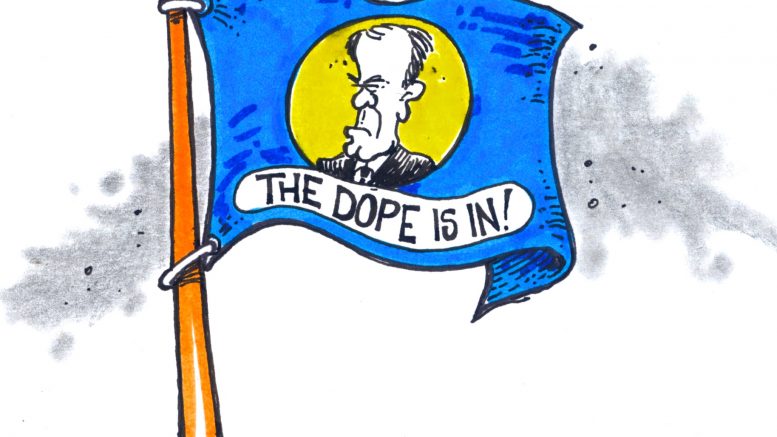“His Royal Heinous Sir Ryan of Zinke, clown prince of Interior, has an official flag that is raised when he appears at his departmental seat.”
By Jessica Corbett
Common Dreams (10/13/17)
The Washington Post on Thursday reported that the Department of the Interior raises the department’s official flag above its Washington, D.C. headquarters to indicate when Secretary Ryan Zinke visits the office.
Zinke—who has cultivated a reputation for launching unprecedented attacks on public lands and jettisoning key protections for wildlife—”has revived an arcane military ritual that no one can remember ever happening in the federal government,” the Post reported.
The Post explained:
“A security staffer takes the elevator to the seventh floor, climbs the stairs to the roof and hoists a special secretarial flag whenever Zinke enters the building. When the secretary goes home for the day or travels, the flag—a blue banner emblazoned with the agency’s bison seal flanked by seven white stars representing the Interior bureaus—comes down.
“In Zinke’s absence, the ritual is repeated to raise an equally obscure flag for Deputy Secretary David Bernhardt.
“Responding this week to questions from the Washington Post, a spokeswoman for Zinke, a former Navy SEAL commander, defended the Navy flag-flying tradition as “a major sign of transparency.”
“Ryan Zinke is proud and honored to lead the Department of the Interior, and is restoring honor and tradition to the department, whether it’s flying the flag when he is in garrison or restoring traditional access to public lands,” press secretary Heather Swift said in an email.”
While flying a flag to indicate that the boss is on-site remains a military custom, it has for the past several years fallen out of practice among the federal government agencies—although it reportedly remains part of the department’s official manual. Zinke is a former Navy SEAL.
“I’m all about tradition…. but I kind of have an aversion to militarizing everything in our government,” Joseph McMillan, a retired Defense Department official who is a student of flag history and president of the American Heraldry Society, told the Post. “The world doesn’t need to know the secretary of the Interior is in the building.”
“We’re talking about cabinet members and federal buildings, not the Queen of England and Buckingham Palace,” added Chris Lu, deputy labor secretary in the Obama administration. In the U.K., royal residences indicate the queen’s presence by raising the Royal Standard.
The report provoked several jokes on social media, often accompanied by ridicule of Zinke’s agenda as head of the Interior Department. [Follow link below.]
(Commoner Call cartoon by Mark L. Taylor, 2017. Open source and free to use with link to www.thecommoner.call.org )
*****
Groups Slam Zinke’s ‘backroom deals’ To Build Road Through Alaskan Wildlife Refuge
By Lorraine Chow
Nation of Change (10/17/17)
Ryan Zinke’s Interior Department is working behind the scenes to build a controversial and long-contested road through the heart of Alaska’s Izembek National Wildlife Refuge, documents show.
The refuge was established more than 30 years ago to conserve wetlands and habitats for migrating birds, brown bears and salmon and other wildlife. 300,000 of its 315,000 acres has been designated as Wilderness in 1980 under the Alaska National Interest Lands Conservation Act.
The proposed 11-mile road would essentially bisect Izembek to connect the towns of King Cove, population 989, and Cold Bay. Proponents, including Alaska Gov. Bill Walker, say the road is needed for medical emergency evacuations, as King Cove’s airport is inaccessible during inclement weather, forcing residents to use boats or helicopters.
But refuge advocates fear the road would disrupt critical wildlife habitat and set a precedent to open wildlife refuges, national monuments, wilderness areas and other public lands to economic development.
The Center for Biological Diversity, the National Wildlife Refuge Association, and other environmental organizations have also warned that the project is about “privatizing public lands for profit from a seafood venture.”
The Obama administration shelved the King Cove road project years ago after then-Interior Secretary Sally Jewell decided after a 2013 visit to the refuge that building a road would “cause irreversible damage not only to the Refuge itself, but to the wildlife that depend on it.”
“These records expose yet another of Secretary Zinke’s secretive, backroom deals to sell off and sell out our public lands and wildlife.”
In June, however, Zinke’s Interior department issued the state permission to survey a route for the road. Then in July, the House of Representatives voted along party lines to authorize a land swap between Alaska and the federal government to build the one-lane road. Sen. Lisa Murkowski (R- Alaska), who has long fought for the road, introduced a Senate version of the bill that is still pending.
Now, a new report from the Washington Post suggests that the Trump administration is making the issue a top priority and has taken steps to hide discussions from the public.
According to the Post’s report:
“Those documents, primarily internal agency emails, reveal how much discussion is intentionally taking place out of public view as federal, state, local and tribal officials work to approve a land exchange. Were the targeted terrain owned by the King Cove Corporation, that would clear the way for construction through the refuge to join up roads on either side.
[…]
“The documents from the U.S. Fish and Wildlife Service make clear that Interior Secretary Ryan Zinke has elevated the issue to one of the agency’s top priorities, and his appointees have taken deliberate steps to conceal the plan from the public.
“At one point, a refuge official relayed his conversation with a department attorney about questions Zinke raised over public review of agency action related to Alaska’s survey of a possible road through Izembek.
““He indicated the Secretary would like to see folks on the ground doing the survey in the next couple of days,” the official emailed colleagues. “He did not seem to [sic] excited about the direction that it was going out for public comment.””
The documents were obtained by Defenders of Wildlife under the Freedom of Information Act.
“These records expose yet another of Secretary Zinke’s secretive, backroom deals to sell off and sell out our public lands and wildlife,” said Jamie Rappaport Clark, president and CEO of Defenders of Wildlife. “We will not stand by and watch while some of the most important wildlife habitat on the planet is sacrificed for surreptitious commercial interests. If this proposal, which reflects a terrible abuse of power, is successful in Izembek, then none of our public lands, waters and wildlife will be safe.”
The Wilderness Society also issued the following statement from Alaska Regional Director Nicole Whittington-Evans.
“This is an appalling move by the Trump administration to bypass the public process and cut a sneaky, backroom deal that not only would harm Izembek Refuge, but will threaten all of our nation’s refuges, public lands, and many of our bedrock environmental laws,” Whittington-Evans said. “This proposed road is an economic-development project for the community of King Cove, and taxpayers should be outraged at this secretive attempt to gut a globally important wildlife refuge – which belongs to all Americans – by transferring public lands to private ownership.”
“The Izembek land exchange and road proposal have been considered many times – most recently through an exhaustive, scientific study by the U.S. Interior Department, which determined that the road should not be built and that it would harm the very species the refuge was established to protect,” Whittington-Evans added.
“The Army Corps of Engineers in 2015 issued a report emphasizing that several alternatives to a road would effectively meet the emergency needs of King Cove residents. If this were about medical evacuations, as road proponents claim, the government should be talking about other options that would result in faster and more reliable transportation, instead of conspiring to strip protections from the Izembek refuge.”


